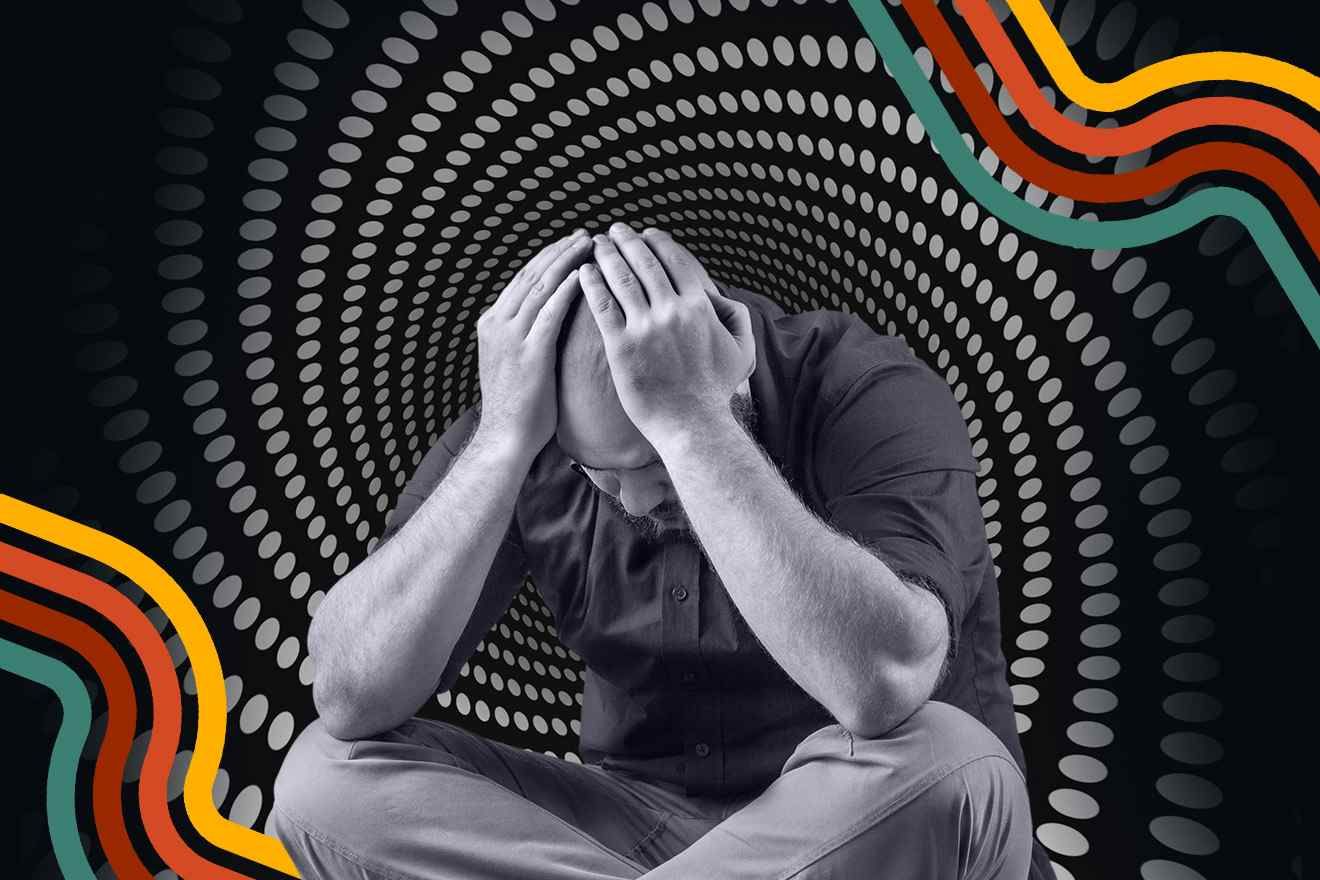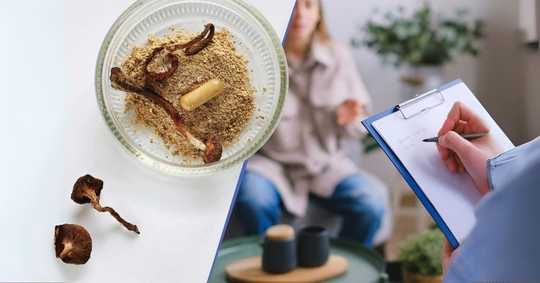It sounds counterintuitive to use psychedelic substances as a treatment for addiction recovery. People who struggle with substance use may be vulnerable to new dependencies, right? Yet the research (and funding) for psychedelic therapy as addiction treatment is growing. Addiction treatment centers and therapists may benefit from adding psychedelics to their toolbelt of treatments. Read on to learn about psychedelic therapy for addiction recovery.
More than 20 million Americans are affected by a substance use disorder today.1 According to the Substance Abuse Mental Health and Service Administration – many with addiction struggles before the pandemic leaned heavily on substances in 2020 and 2021.2
There are physical risks of being dependent on alcohol and other substances. But people with substance use disorder are also more at risk for thoughts of suicide.2 Severe anxiety and depression are commonly co-morbid with substance use disorder. And they are much higher among addicts than in the general population.3 The complexity of addiction – as both a mental and physical illness – has historically made it difficult to meet the needs of these patients.
The traditional treatment plan for substance addiction uses a combination of:
- Inpatient rehabilitation
- Psychiatric medications
- Talk and group therapy
Yet even after these intensive methods, it’s estimated that 40-60% of people relapse after addiction treatment.4
It’s clear that we need to serve these patients better. And in the last decades, psychedelics have emerged as a potential solution. Earlier this year, the National Institute on Drug Abuse gave a $2.7 million grant to research on psychedelics for addiction.5 As these therapies move from research into clinical practice – it’s essential for more clinicians to be educated in the principles of psychedelic therapy.
Are you a therapist treating patients with substance use? Then understanding psychedelic methods puts you in a pivotal position. It makes you an essential leader in bringing psychedelic therapy for substance addiction recovery. Several substances are moving towards FDA approval. So we’re closer than ever to integrating psychedelic therapy in mental health care systems.
Psychedelic Support is a leading educator in entheogenic medicine. Psychoactive substances like:
- Ketamine
- Psilocybin
- LSD
- Ayahuasca
- Ibogaine
…may be an important pillar in the addiction treatment of the future. And we’ll need compassionate, educated psychedelic therapists (like you!) to bring these treatments to patients.
If you’re just starting your educational journey – you’re in the right place. We’ve got tons of resources for therapists. Whether you’re just learning about psychedelics or you’re a seasoned provider, we’ve got you covered. Are you curious about these therapies? You probably have lots of questions to clear up before you invest your time and money into education.
How does psychedelic therapy for addiction work? Let’s break down the process.
Psychedelic Therapy for Addiction Recovery: How it Works
If you’re already seeing patients for substance use – adding psychedelics into your therapeutic treatment plans may sound like an overhaul of your existing systems. But whether you work inpatient or outpatient, entheogenic care plans don’t have to completely change how you work with patients.
Here’s a step-by-step guide to substance use treatment with psychedelics:
- Acute Detox
Patients who present with substance use disorder need to detox before starting therapeutic interventions. This may take a few days to a week, and it’s often a physically and mentally painful process. Depending on the substance and use severity, inpatient treatment may be essential to keep patients safe during this phase.
Follow your Curiosity
Sign up to receive our free psychedelic courses, 45 page eBook, and special offers delivered to your inbox.The therapist takes a back seat during this medical detoxification phase. Leaders of the medical psychiatric team evaluate a patient for a psychedelic therapy consult. Some patients may not be candidates for therapy because of their history. For instance, those with psychotic diagnoses and cardiac problems may not be appropriate. Psychedelic therapy isn’t a good solution for everyone.
There is some early research that suggests that ketamine could be helpful for patients detoxing from opiates and alcohol withdrawal. And some studies also suggest a similar benefit for psilocybin.6,7,8 This research is more early along than psychedelic therapy for addiction recovery, and patients are medically and psychologically vulnerable during this stage. So we might see these interventions implemented much later.
- Laying The Groundwork for Therapy
Once patients are stabilized, you as the therapist start building therapeutic rapport. This looks like typical therapy intake sessions, with assessments of a person’s history of:
- Abuse
- Trauma
- Psychiatric diagnoses
- Psychedelics use
It’s essential for the patient to experience a foundation of safety during the rapport-building process.
Along with trust-building, this phase is essential for educating the patient on what they may expect from psychedelics. Under harm reduction philosophies it’s essential for patients to make their own treatment plan decisions. This model demands that patients take an active role in their care. Not every patient may want to embark on this journey, and that’s okay.
If the patient decides to continue with psychedelic therapy after understanding the benefits, side effects, and risks – it’s time to have their psychedelic sessions.
- Therapeutic Psychedelic Sessions
Depending on the substance, patients may have between one and five psychedelic sessions per round of therapy. These are supervised by one or several members of the co-therapy team, and may last between three and eight hours. The patient is laying down during this time, with their eyes covered, and soft music playing. Set and setting are essential. They help the patient feel safe and have the most therapeutic experience possible.
A therapist, nurse, and facilitator – or some combination of these – help the patient feel safe during these sessions. A medical supervisor may be on-call, supervising several sessions at once. This person may be a medical doctor, nurse practitioner, or physician’s associate. This person may also help lead the decision process for which psychedelic a patient may benefit the most from.
Let’s briefly go over the psychedelics that have shown the best outcomes in treating addiction so far.
Research on Psychedelics for Addiction Treatment
- Ketamine is already being used in addiction treatment for alcohol, cocaine, opioids, and cannabis. It’s shown to help with abstinence and cravings across these substances.9
- Psilocybin therapy has been effective for treating alcohol use disorder in trials when compared to placebo.10 It’s also been studied in the treatment of tobacco addiction, and others.11
- MDMA has given helpful results in late-stage trials including patients with PTSD and substance dependency.12
- LSD has been researched to help patients with alcohol dependency, with good success.13
- Ibogaine has shown success in helping patients with opioid withdrawals and cessation over time.14
But the psychedelic experience is only a part of this new model for care. Integration therapy is interspersed with these psychedelic sessions. It’s essential that patients take the time to unpack their experiences. This helps them gain insights to continue building on. Let’s get into what this therapy looks like.
- Integration Therapy
Integration therapy is essential for patients to fully explore the experiences they had while using psychedelics. These sessions may be challenging for patients. They may find themselves reliving trauma, or being forced to take a new perspective on their lives. It’s this phase of psychedelic therapy that helps patients integrate their psychedelic sessions into the reality of life.
Experienced therapists are able to use their expertise in multiple therapy modalities to help patients integrate. And this process may not stop after patients have finished their round of psychedelic sessions. Let’s talk about the ongoing support that patients may need after initial addiction recovery.
- Ongoing Addiction Recovery Support
As many patients will attest, addiction recovery doesn’t stop after the initial recovery period is over. Patients may need ongoing support from therapists and the co-therapy team. Many people who have been dependent on a substance for several years face medical problems as well as psychological ones.
Patients who undergo psychedelic therapy for addiction recovery should have an ongoing relationship with a therapist afterwards. This may be a psychedelic therapist – but not all therapists want to participate in this form of therapy. At the least, therapists who do not want to offer psychedelic therapy to their patients should understand its indications. And they should be able to offer referral resources for appropriate patients.
Patients need your help to access psychedelic-assisted therapy for substance use. What should therapists like you do if you’re interested in starting your own educational journey?
References
- 06/30/2022, J. F. M. on. (n.d.). New research and insights into substance use disorder. New Research and Insights into Substance Use Disorder. Retrieved December 15, 2022, from https://www.hopkinsmedicine.org/news/articles/new-research-and-insights-into-substance-use-disorder
- Samhsa releases 2020 National Survey on Drug Use and health. SAMHSA. (2021, October 26). Retrieved December 15, 2022, from https://www.samhsa.gov/newsroom/press-announcements/202110260320
- Mohamed, I.I., Ahmad, H.E.K., Hassaan, S.H. et al. Assessment of anxiety and depression among substance use disorder patients: a case-control study. Middle East Curr Psychiatry 27, 22 (2020). https://doi.org/10.1186/s43045-020-00029-w
- Kabisa, E., Biracyaza, E., Habagusenga, J.d. et al. Determinants and prevalence of relapse among patients with substance use disorders: case of Icyizere Psychotherapeutic Centre. Subst Abuse Treat Prev Policy 16, 13 (2021). https://doi.org/10.1186/s13011-021-00347-0
- Null. (2022, June 6). $2.7m grant to find new addiction treatments related to psychedelics. news. Retrieved December 16, 2022 from https://health.ucdavis.edu/news/headlines/27m-grant-to-find-new-addiction-treatments-related-to-psychedelics/2022/05
- Jovaisa T, Laurinenas G, Vosylius S, Sipylaite J, Badaras R, Ivaskevicius J. Effects of ketamine on precipitated opiate withdrawal. Medicina (Kaunas). 2006;42(8):625-34. PMID: 16963828.
- Shah P, McDowell M, Ebisu R, Hanif T, Toerne T. Adjunctive Use of Ketamine for Benzodiazepine-Resistant Severe Alcohol Withdrawal: a Retrospective Evaluation. J Med Toxicol. 2018 Sep;14(3):229-236. doi: 10.1007/s13181-018-0662-8. Epub 2018 May 10. PMID: 29748926; PMCID: PMC6097970.
- Mendes, F. R., Costa, C. dos, Wiltenburg, V. D., Morales-Lima, G., Fernandes, J. A., & Filev, R. (2022). Classic and non‐classic psychedelics for substance use disorder: A review of their historic, past and current research. Addiction Neuroscience, 3, 100025. https://doi.org/10.1016/j.addicn.2022.100025
- Jones, J. L., Mateus, C. F., Malcolm, R. J., Brady, K. T., & Back, S. E. (2018). Efficacy of ketamine in the treatment of Substance Use Disorders: A systematic review. Frontiers in Psychiatry, 9. https://doi.org/10.3389/fpsyt.2018.00277
- Bogenschutz, M. P., Ross, S., Bhatt, S., Baron, T., Forcehimes, A. A., Laska, E., Mennenga, S. E., O’Donnell, K., Owens, L. T., Podrebarac, S., Rotrosen, J., Tonigan, J. S., & Worth, L. (2022). Percentage of heavy drinking days following psilocybin-assisted psychotherapy vs placebo in the treatment of adult patients with alcohol use disorder. JAMA Psychiatry, 79(10), 953. https://doi.org/10.1001/jamapsychiatry.2022.2096
- Garcia-Romeu A, Griffiths RR, Johnson MW. Psilocybin-occasioned mystical experiences in the treatment of tobacco addiction. Curr Drug Abuse Rev. 2014;7(3):157-64. doi: 10.2174/1874473708666150107121331. PMID: 25563443; PMCID: PMC4342293.
- Nicholas, C. R., Wang, J. B., Coker, A., Mitchell, J. M., Klaire, S. S., Yazar-Klosinski, B., Emerson, A., Brown, R. T., & Doblin, R. (2022). The effects of MDMA-assisted therapy on alcohol and substance use in a phase 3 trial for treatment of severe PTSD. Drug and Alcohol Dependence, 233, 109356. https://doi.org/10.1016/j.drugalcdep.2022.109356
- Fuentes, J. J., Fonseca, F., Elices, M., Farré, M., & Torrens, M. (2020). Therapeutic use of LSD in psychiatry: A systematic review of randomized-controlled clinical trials. Frontiers in Psychiatry, 10. https://doi.org/10.3389/fpsyt.2019.00943
- Noller GE, Frampton CM, Yazar-Klosinski B. Ibogaine treatment outcomes for opioid dependence from a twelve-month follow-up observational study. Am J Drug Alcohol Abuse. 2018;44(1):37-46. doi: 10.1080/00952990.2017.1310218. Epub 2017 Apr 12. PMID: 28402682.






